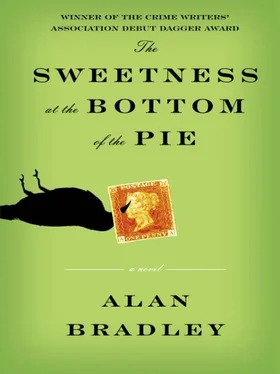Alan Bradley - The Sweetness at the Bottom of the Pie
Здесь есть возможность читать онлайн «Alan Bradley - The Sweetness at the Bottom of the Pie» весь текст электронной книги совершенно бесплатно (целиком полную версию без сокращений). В некоторых случаях можно слушать аудио, скачать через торрент в формате fb2 и присутствует краткое содержание. Жанр: Старинная литература, на английском языке. Описание произведения, (предисловие) а так же отзывы посетителей доступны на портале библиотеки ЛибКат.
- Название:The Sweetness at the Bottom of the Pie
- Автор:
- Жанр:
- Год:неизвестен
- ISBN:нет данных
- Рейтинг книги:3 / 5. Голосов: 1
-
Избранное:Добавить в избранное
- Отзывы:
-
Ваша оценка:
- 60
- 1
- 2
- 3
- 4
- 5
The Sweetness at the Bottom of the Pie: краткое содержание, описание и аннотация
Предлагаем к чтению аннотацию, описание, краткое содержание или предисловие (зависит от того, что написал сам автор книги «The Sweetness at the Bottom of the Pie»). Если вы не нашли необходимую информацию о книге — напишите в комментариях, мы постараемся отыскать её.
The Sweetness at the Bottom of the Pie — читать онлайн бесплатно полную книгу (весь текст) целиком
Ниже представлен текст книги, разбитый по страницам. Система сохранения места последней прочитанной страницы, позволяет с удобством читать онлайн бесплатно книгу «The Sweetness at the Bottom of the Pie», без необходимости каждый раз заново искать на чём Вы остановились. Поставьте закладку, и сможете в любой момент перейти на страницу, на которой закончили чтение.
Интервал:
Закладка:
The panel on the right portrayed Jesus emerging from his tomb, as Mary Magdalene, in a red dress (also iron, or perhaps grated particles of gold), holds out to him a purple garment (manganese dioxide) and a loaf of yellow bread (silver chloride).
I knew that these salts had been mixed with sand and the ashes of a salt marsh reed called glasswort, fired in a furnace hot enough to have given even Shadrach, Meshach, and Abednego second thoughts, and then cooled until the desired color was obtained.
The central panel was dominated by our own Saint Tancred, whose body lay at this very moment somewhere beneath our feet in the crypt. In this view, he is standing at the open door of the church in which we sit (as it looked before the Victorians improved it), welcoming with outstretched arms a multitude of parishioners. Saint Tancred has a pleasant face: He's the sort of person you would like to invite over on a Sunday afternoon to browse through back issues of the Illustrated London News , or maybe even Country Life , and, since we share his faith, I like to imagine that while he snores away eternity down below, he has a particular soft spot for all of us at Buckshaw.
As my mind swam back to the present, I realized that the Vicar was praying for the man I had found dead in the garden.
"He was a stranger among us," he said. "It is not necessary that his name be known unto us."
This would be news to Inspector Hewitt, I thought.
". in order for us to ask God to have mercy on his soul, and to grant him peace."
So the word was out! Mrs. Mullet, I guessed, had wasted no time in scurrying across the lane yesterday to break the news to the Vicar. I could hardly believe he had heard it from the police.
There was a sudden hollow bang as a kneeling bench slammed up, and I looked round just in time to see Miss Mountjoy edging her way crab-wise out of the pews and fleeing along the side aisle to the transept door.
"I feel nauseous," I whispered to Ophelia, who let me slide past her without batting an eye. Feely had a particular aversion to having her shoes vomited on, a useful quirk of which I took advantage from time to time.
Outside, a wind had sprung up, whipping the branches of the churchyard yews, and sending ripples running through the unmowed grass. I caught a glimpse of Miss Mountjoy disappearing among the moss-covered tombstones, heading towards the crumbling, overgrown lych-gate.
What had upset her so? For a moment I considered running after her, but then I thought better of it: The river looped round St. Tancred's in such a way that the church was virtually on an island and, through the centuries, the meandering water had cut through the ancient lane beyond the lych-gate. The only possible way for Miss Mountjoy to make her way home without retracing her steps would be to take off her shoes and wade across the now-submerged stepping-stones that had once bridged the river.
It was obvious that she wanted to be alone.
I rejoined Father as he was shaking hands with Canon Richardson. What with the murder, we de Luces were all the rage as the villagers in their Sunday finery lined up to speak with us or, sometimes, simply to touch us as if we were talismans. Everyone wanted to have a word, but nobody wanted to say anything that mattered.
"Dreadful business that, up at Buckshaw," they'd say to Father, or Feely or me.
"Nasty," we'd reply, and shake hands, and then wait for the next petitioner to shuffle forward. Only when we'd serviced the entire congregation were we free to make our way home for lunch.
AS WE CROSSED THE PARK, the door of a familiar blue car opened and Inspector Hewitt came across the gravel to meet us. Having already decided that police investigations were likely shelved on Sundays, I was a little surprised to see him. He gave Father a brisk nod and touched the brim of his hat to Feely, to Daffy, and to me.
"Colonel de Luce, a few words. in private if you please."
I watched Father closely, fearing he might faint again, but aside from a slight tightening of his knuckles on the handle of his walking stick, he seemed not at all surprised. He might even, I thought, have been preparing himself for this moment.
Dogger, meanwhile, had quietly sloped off into the house, perhaps to change his stiff old-fashioned collar and cuffs for the comfort of his gardening overalls.
Father looked round at us as if we were a gaggle of intrusive geese.
"Come into my study," he said to the Inspector, then turned and walked away.
Daffy and Feely stood gazing off into the middle distance as they are inclined to do when they don't know what to say. For a moment I thought of breaking the silence, but, on second thought, decided against it and walked away in a careless manner, whistling the “Harry Lime” theme from The Third Man .
Since it was Sunday, I thought it would be appropriate to go into the garden and have a look at the place where the body had lain. It would be, in a way, like those Victorian paintings of veiled widows crouching to place a handful of pathetic pansies—usually in a glass tumbler—upon the grave of their dead husband or mother. But somehow the thought made me sad, and I decided to skip the theatrics.
Without the dead man, the cucumber patch was oddly uninteresting, no more than a patch of greenery with here and there a broken stalk and something that looked suspiciously like the drag mark of a heel. In the grass, I could see the perforations where the sharp legs of Sergeant Woolmer's heavy tripod had pierced the turf.
I knew from listening to Philip Odell, the private eye on the wireless, that whenever there's a sudden and unexpected death, there's bound to be a postmortem, and I couldn't help wondering if Dr. Darby had yet had the body—as I had heard him remark to Inspector Hewitt—“up on the table.” But again, that was something I dared not ask, at least not just yet.
I looked up at my bedroom window. Reflected in it, so close I could almost touch them, images of plump white clouds floated by in a sea of blue sky.
So close! Of course! The cucumber patch was directly below my window!
Why, then, had I heard nothing? Everyone knows that the killing of a human being requires the exertion of a certain amount of mechanical energy. I forget the exact formula, although I know there is one. Force applied in a short span of time (for instance a bullet), makes a great deal of noise, whereas force applied more slowly may well make no noise at all.
What did this tell me? That if the stranger had been violently attacked, it had happened somewhere else, somewhere out of earshot. If he had been attacked where I found him, the killer had used a silent method: silent and slow since, when I found him, the man had been still, although barely, alive.
" Vale ,” the dying man had said. But why would he say farewell to me? It was the word Mr. Twining had shouted before jumping to his death, but what was the connection? Was the man in the cucumbers trying to link his own death with that of Mr. Twining? Had he been there when the old man jumped? Had he been part of it?
I needed to think—and to think without distractions. The coach house was out of the question since I was now aware that, in times of trouble, I might well encounter Father sitting there in Harriet's Phantom. That left the Folly.
On the south side of Buckshaw, on an artificial island in an artificial lake, was an artificial ruin, in the shadow of which was a little Greek temple of lichen-stained marble. Now sunk deep in neglect and overgrown with nettles, there had been a time when it was one of the glories of England: a little cupola on four exquisitely slender legs that might have been a bandstand on Parnassus. Countless eighteenth-century de Luces had poled their guests out to the Folly on festive flower-strewn barges, where they had picnicked upon cold game and pastry as they watched the swans glide across the glassy water, and looked through quizzing-glasses at the hired hermit as he gaped and yawned at the doorway of his ivy-clad cave.
Читать дальшеИнтервал:
Закладка:
Похожие книги на «The Sweetness at the Bottom of the Pie»
Представляем Вашему вниманию похожие книги на «The Sweetness at the Bottom of the Pie» списком для выбора. Мы отобрали схожую по названию и смыслу литературу в надежде предоставить читателям больше вариантов отыскать новые, интересные, ещё непрочитанные произведения.
Обсуждение, отзывы о книге «The Sweetness at the Bottom of the Pie» и просто собственные мнения читателей. Оставьте ваши комментарии, напишите, что Вы думаете о произведении, его смысле или главных героях. Укажите что конкретно понравилось, а что нет, и почему Вы так считаете.












